Assessment as Data
One of the core memories from my undergraduate experience was in my assessment course taught by Dr. Darrel Walters at Temple University. On one mind-blowing morning circa 2006, he proposed that, as teachers, assessment was a tool to measure how well we taught our students. It was a method for learning and understanding more about the students and their needs. It was data.
I couldn’t help but think back on my experiences as a student- assessments that seemed unfair or poorly constructed. The biology teacher who copied and pasted his tests so many times, they were rife with errors. Or, the professor who would shame all of his students who failed his assessment, despite the fact that none of the questions referred to the material we were taught in class.
Creating valid and reliable assessments is hard! But, as a teacher, I loved finding ways to learn more about my students in general through not only formal assessments but questionnaires, exit tickets, and more.
Personality Quizzes and the Classroom
Lately, I’ve been doing some research on personality quizzes. What is it about personality quizzes that get me so excited? (I’m an Enneagram 3 in case you’re interested.) I think we love assessments that help us make sense of ourselves in the world and help us connect with others who are the same (or different!)
A quick buzzfeed quiz search boasts catchy headlines like, “Pick Your Favorite Fall Item and I’ll Tell You Which Spooky Family You Belong To!” Suddenly, I find myself wanting to discover my perfect fall aesthetic and see which Scooby Doo character is my doppelganger.
Last year, I connected my love for personality quizzes and classroom assessment for getting to know my students. I spent hours developing a personality quiz for students on their listening preferences. I figured it would be a fun alternative to my typical questionnaire and would provide critical information on their past experiences with music. [For reference, my co-teacher Stefanie and I always gave this creative profile quiz to our students. I wanted something similar for music!]
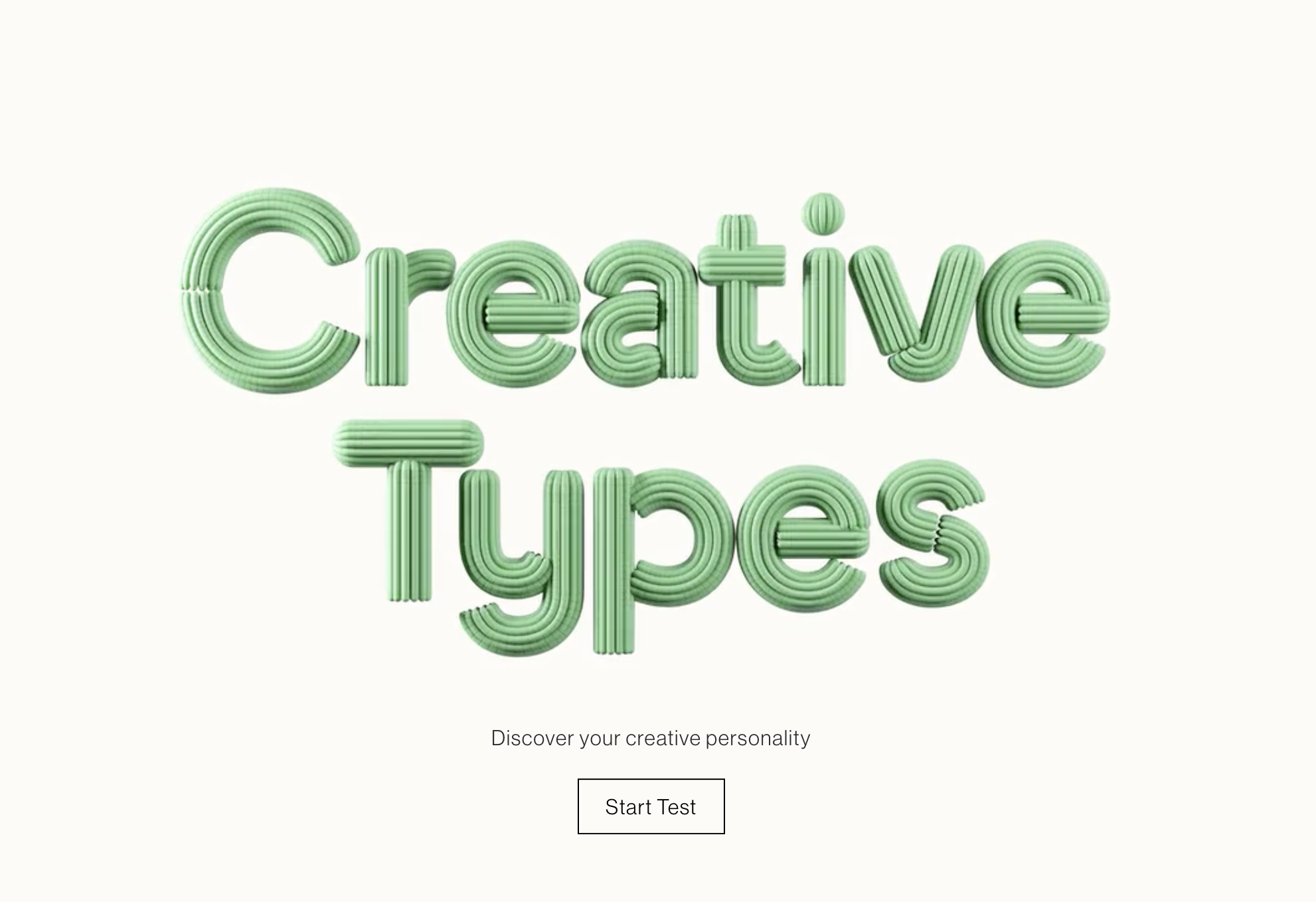
But, creating one of these quizzes takes a looonnngggg time. You have to develop “profiles” that you are trying to assess, develop questions that are relative to the profiles, and then make sure the answers all point to specific outcomes. Surely, there must be a better way to use this type of assessment in the classroom.
Enter AI.
I decided to build a personality quiz for F-flat Books and see if AI could help me be more efficient. I am happy to report that instead of spending HOURS creating this quiz, I completed it in 30 minutes (including the time it took to build it on my chosen quiz builder, interact. However, you could do something similar using google docs and spreadsheet data.)
My Method
I used the free version of ChatGPT and started with a quiz theme: “What type of music teacher are you?” It was hard to boil down “types” of music teachers, but I imagined four types that could be shaped into specific qualities: The Creative, The Leader, The Nurturer, and The Planner. Now, I’d like to believe that I am all of the above, but is there one aspect of my teaching personality that lends itself to one of these categories? That is what I was hoping the quiz would measure.
I started by asking ChatGPT to begin with a description of a “planner” type person, and here is part of the response:
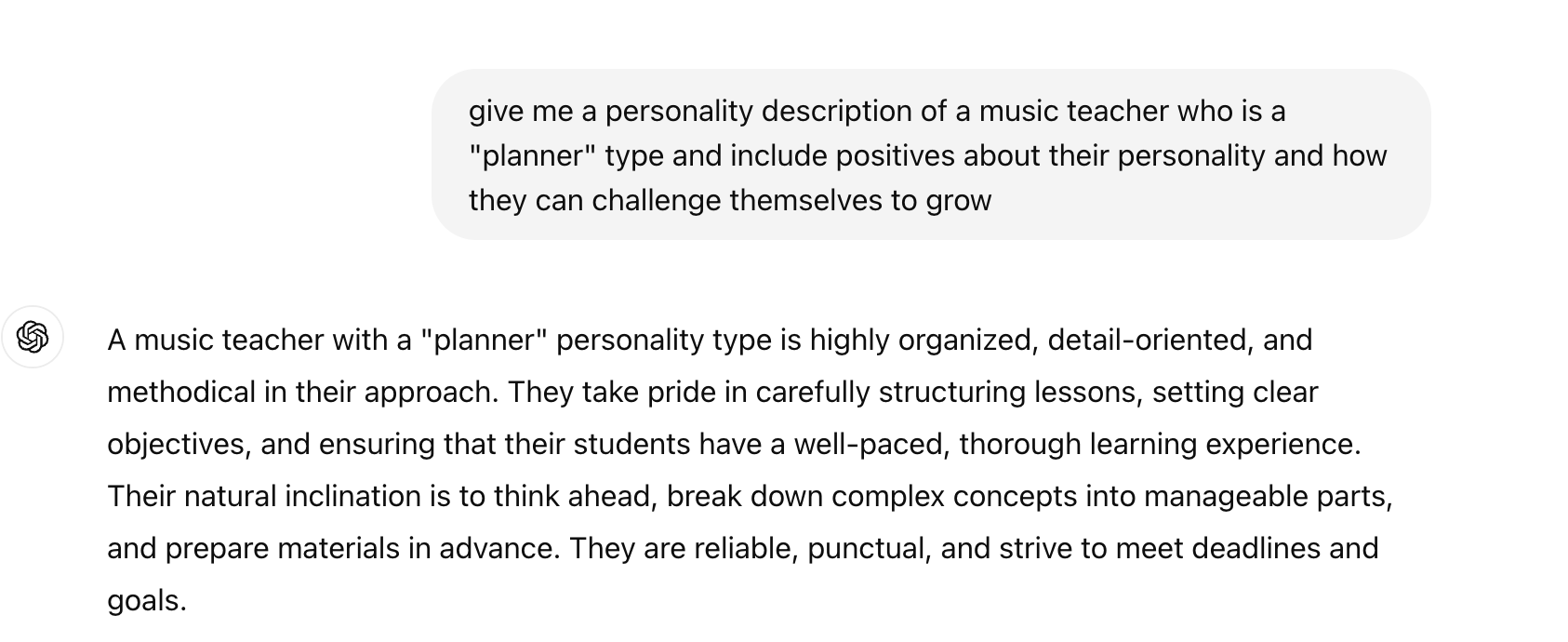
It included bullet points and many descriptions. I asked it to tighten the description.
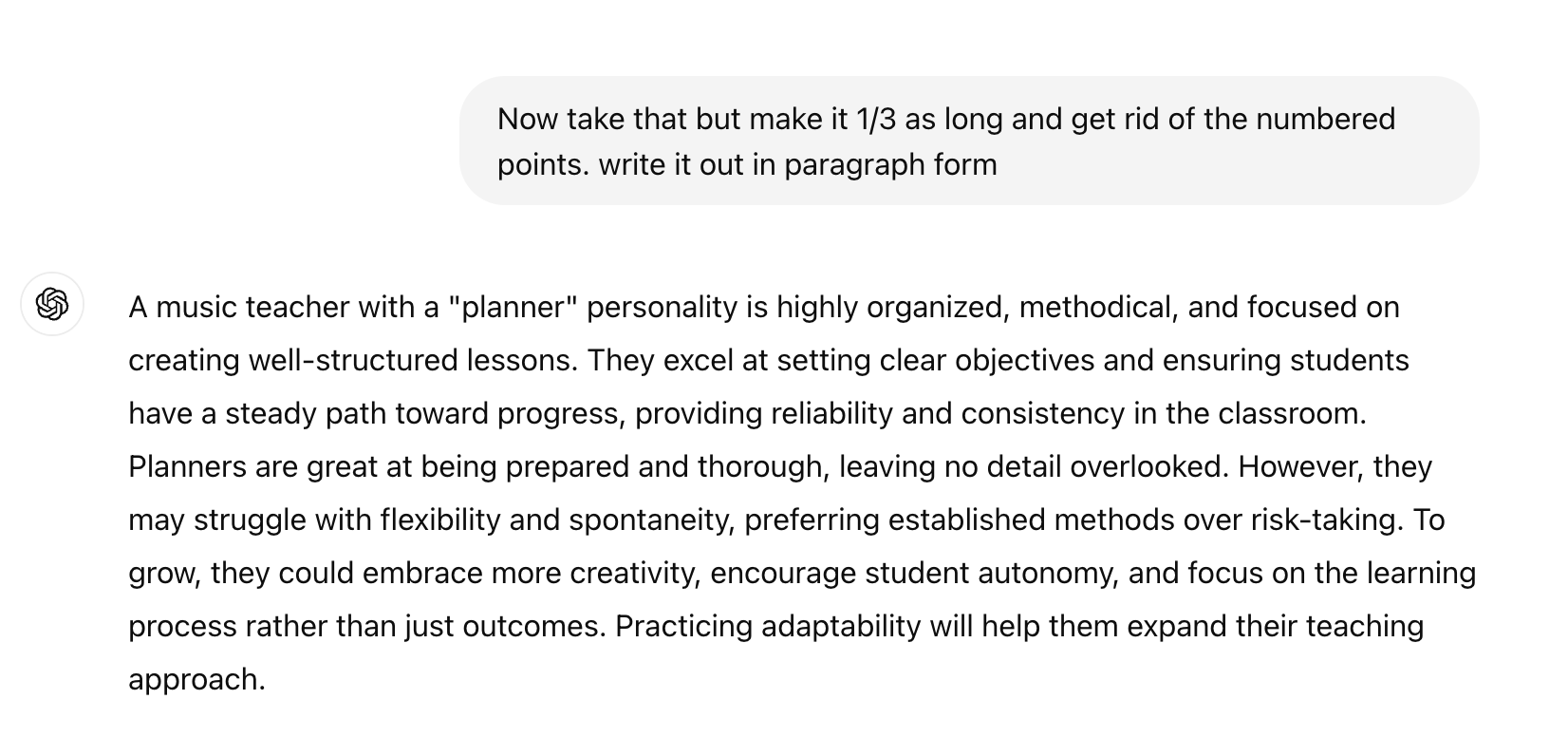
Great! Now we were getting somewhere. I asked it to do the same for the other personality types.
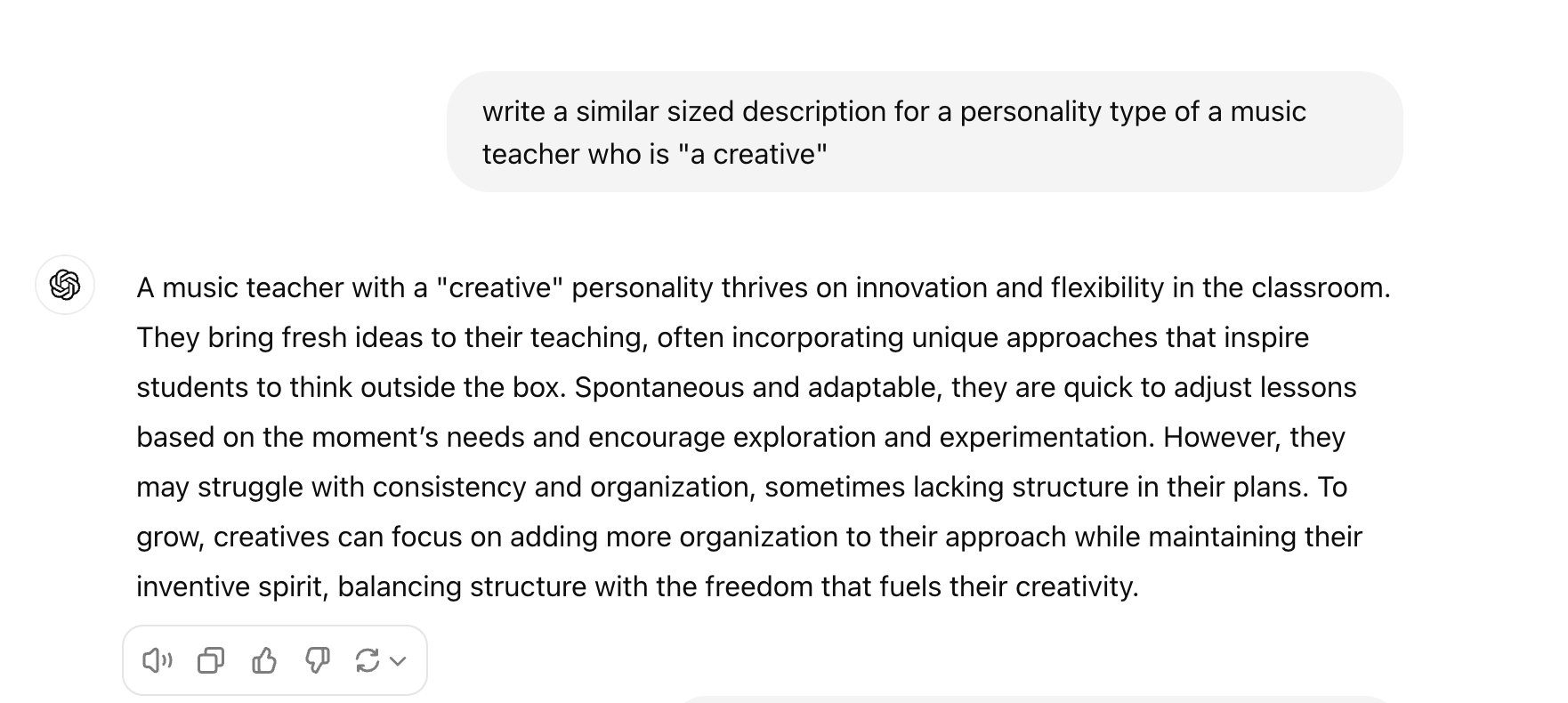
Once I had four specific types, it was time to develop questions. Here is how I phrased my request:
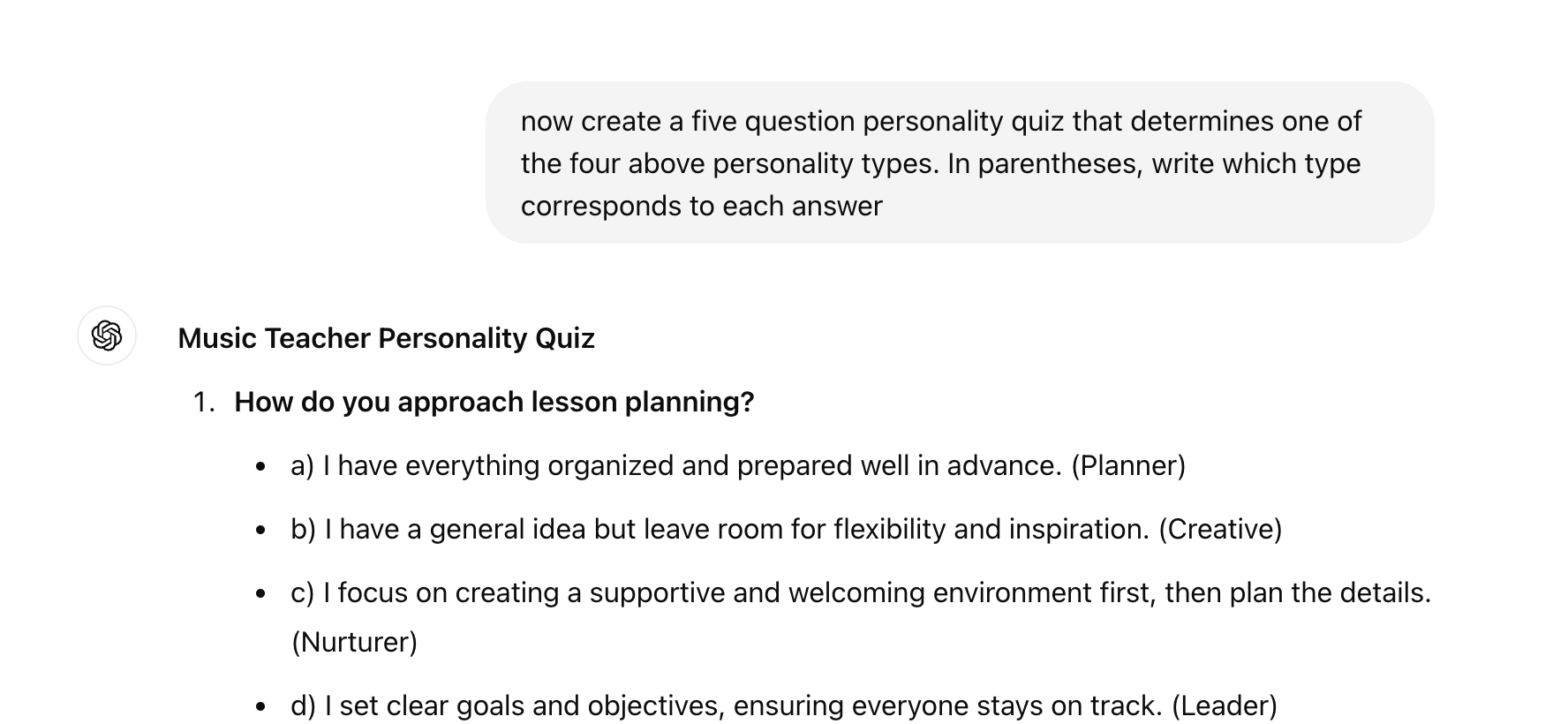
I tweaked the questions and uploaded everything into my quiz maker, linking to specific types. Then, I asked some teachers to take the quiz and let me know if they felt it was accurate. Everyone who responded said they thought it was spot on (even if the “areas of growth” identified by AI felt a little personal).
(If you’re interested in taking the quiz, you can do so below and see which type you are! Although, now that you know the outcomes, you might be influenced to answer in a specific way!)
Application for the classroom
After going through this process, I can imagine so many applications for the classroom! Imagine what you could do with fun, playful assessments that give you valuable information about students, staff, parents, or more! Here are some ways that I can imagine using personality quizzes (shoutout to our community members who have added to this conversation:
- Determine student listening preferences. Get to know more about your students musical lives outside of school.
- Figure out the level of caregiver involvement. Understand more about your students’ caregivers and how they might be helpful to your program.
- Nail down teaching philosophy. Develop a quiz that nails down your teaching approach and offer it to all of the arts educators in your district! Compare your answers and discuss how they might affect your approach.
- Help streamline instrument selection. Learn more about student preference for timbre and instrument function through a personality quiz that connects with instrument selection.
- Get important baseline information on your students. Looking for ways to determine if your students feel comfortable sharing in class? If they have hesitations about the class? Instead of an open-ended questionnaire, think about providing a quiz that provides this information.
Points to Consider
While developing a personality quiz can be fun and beneficial, it is also important to note that we should never create something that makes our students feel “boxed in” or judged. While a quiz like this could be valuable data for you, you need to consider whether or not the results would be helpful to share with students! For example, if I were creating my “What type of music teacher are you?” quiz for students, I might just include positives in the descriptions unless I thought it was beneficial. And then, we might discuss the results together to see if they agreed.
I also want to mention that ChatGPT or any AI tool can have hallucinations, and we must proof and edit whatever we use!
If you want to use more AI tools in the classroom, check out Patrick Cooper and Donna Ream’s book, AI for the Art and Music Classroom.
Do you think you’ll try this? Did you take the quiz and get the result you thought you would? Share your thoughts in the comments!



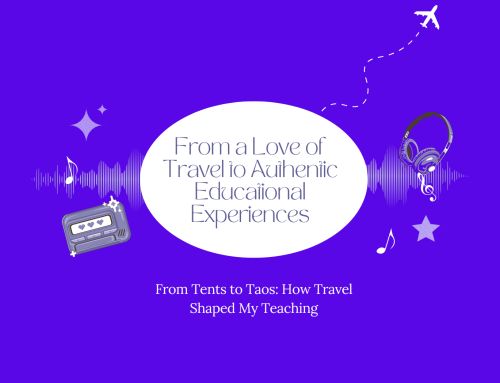
Leave A Comment